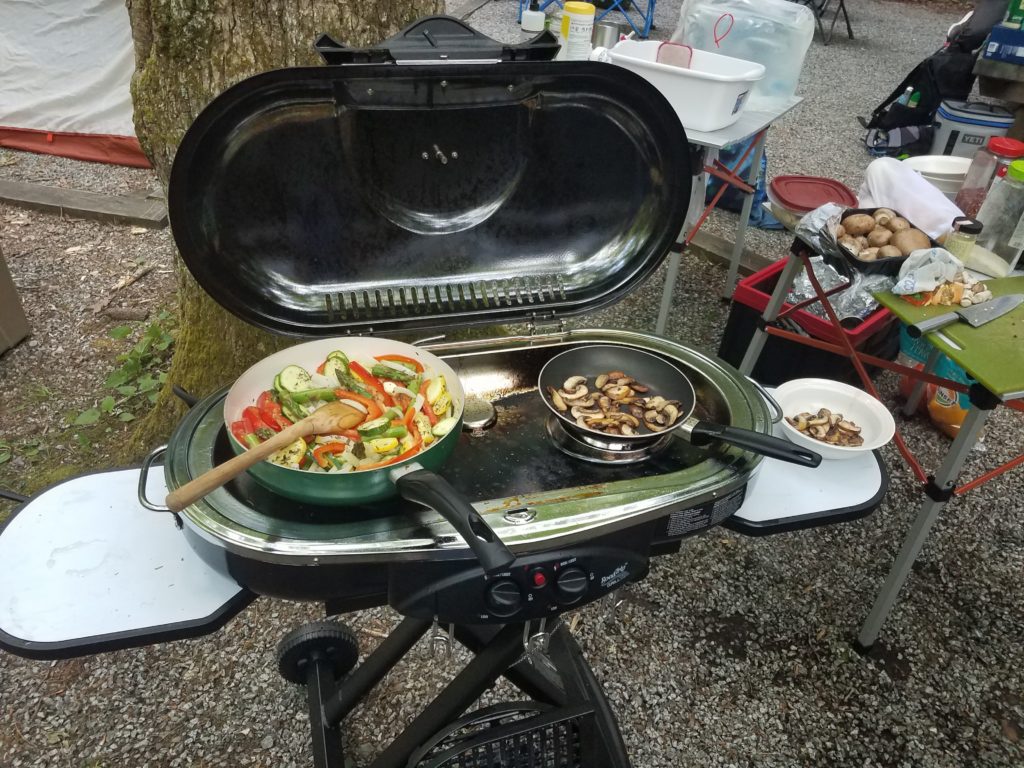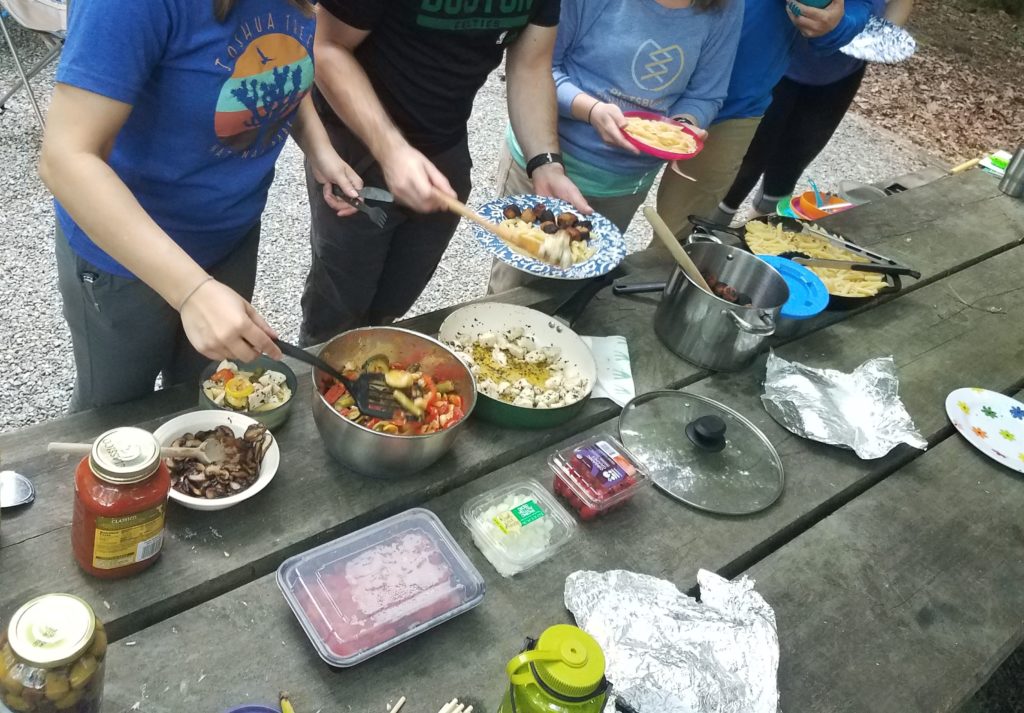Part 4: The Breakthrough
The last installment of our Memorial Day adventure into the woods brought us as close as we were going to get to the 72-hour mark. There were many creature comforts keeping us tied to our daily lives, but I was curious to see if anyone would find an out-of-the-ordinary benefit or experience something unexpected during our last few hours in camp.
Sunday, late:
After our leisurely discussion about experiences in nature across various cultures and disciplines, the group (minus Christian) prepared for another hike, shorter than the day before, but with a steeper climb. Our destination was a scenic overlook, but once we got there after about two hours of hiking, it wasn’t very scenic or much of an overlook. Glimpses of the valley were about all we got through the thick trees at this place that was described on the map as a beautiful photo area.

During the hike we had a lot of conversations about topics that ranged from physical activity (workouts we like vs. workouts we feel we are “supposed” to be doing), weight loss (and gain), politics, climate change, and ticks (of which the group had several, Cora the dog being quite the magnet).
We had originally planned to spend the afternoon going to a nearby lake, but since the hike took longer than expected, the thought of hanging out at camp seemed like a nice alternative. By the time we got back, Christian had restocked the ice in the coolers and purchased a new propane tank in preparation for our evening meal.
Four of us were in charge of dinner for that night, and Christian was in his element. The “Pasta Bar” he planned was the height of glamping: pasta (gluten-free and regular); stir-fried veggies, chicken, and meatballs; marinara, pesto, and Alfredo sauces; parmesan, red pepper flakes, and other seasonings.
We had various cutting and cooking stations set up with chefs and sous-chefs, using the two-burner propane grill to cook the various ingredients. Everything was laid out on the picnic table so campers could make meatball marinara, chicken Alfredo, pasta primavera, or whatever their imaginations could come up with. I was pleased it was such a rousing success. Again, the only thing that made it feel like camping was that we were sitting in camping chairs around a fire – we were certainly not roughing it.
On our last night in the wilderness, we sat around the fire trying to remember names of ice cream brands and restaurants from our youth. It was actually like the days of our youth because we had no Google to look up these simple facts. We reminisced about what life was like before we were tethered to our phones with constant access to the internet.
No one was distracted; everyone was present. D said she was tired physically but awake mentally. K said he was not ready to go back to the city.
As if on cue, our perfect weather came to an end. The skies opened up, and sudden rain had us all scrambling to toss chairs under the picnic table, food in cars, and ourselves in our tents. There was not much else to do at that point but my favorite camping activity: listening to the sound of rain on canvas.

Monday, early:
I woke up from a seriously upsetting nightmare at 4am. I woke Christian up and cried while he held me. Although it was still hours from sunrise, I was afraid to go back to sleep. Once dawn came, I couldn’t get out of that tent and into the light fast enough.
I sat by the fire pit, drinking my tea, and I quickly went to the safety of analyzing the situation, rather than dealing with the emotions I was experiencing. Based on three consecutive days’ stress levels and each subsequent night’s dreams, I could demonstrate a strong inverse relationship between stress experienced in the waking world and in the dreaming world.
Over breakfast, M stated that he had also experienced “vivid dreams” while on the trip, the third night’s involving his death after falling down an elevator shaft. (No one else in the group seemed to experience anything particularly disturbing.)
Of course the human brain is not a simple thing, and there are plenty of factors at play, but I tried to find explanations for my dream. The previous day on our hike, we were discussing our current book for book club, Educated by Tara Westover.[1] It is highly possible that conversations about the abuse the author experienced shook loose some disturbing memories from an abusive relationship I had been in several years earlier.
The thing that struck me in particular is that I do not recall having had a nightmare or even a dream of any kind about that relationship since getting out of the situation over four years ago. I would occasionally have some emotional flashbacks in my waking life, but my dreams were always safe. After the initial panic of the dream wore off, I was mostly upset that this person was back in my thoughts, eating up emotional and mental bandwidth. I chided myself thinking “I should be over this by now,” which, of course, is not how trauma works.
I am not positive, but I seem to remember something not dissimilar in Eat, Pray, Love,[2] when Elizabeth Gilbert describes spending some quiet time by herself on an island, and some unaddressed emotional pain comes to the surface in very short order. I wondered if it was simply that in the absence of anything substantial in my conscious life for my brain to fix upon for three days, my own trauma rose to the surface in my dreams more easily.
Last week when I was writing Part 3 of this series, I found and referenced an article on the use of ayahuasca in trauma recovery. This particular quote contributed to a Three-Day Effect epiphany:
“Classic psychedelics such as DMT [dimethyltryptamine] – an active component of ayahuasca – break the control that the prefrontal cortex normally holds over more primitive parts of the brain, triggering vivid hallucinatory memories and emotions. ‘That lets us go to places in our psyche or internal landscape that we wouldn’t normally allow ourselves to go,’ says Gerald Thomas, who researches addiction at the University of Victoria, British Columbia. ‘In psychotherapy, it’s how we reconcile past events that have traumatised us.’” [3]
The 3-Day Effect,[4] the book that spurred this whole blog discussion in the first place, talked about how one of the effects observed after three days in nature was a relaxation of the prefrontal cortex, the “executive taskmaster” of the brain, like resting an overused muscle:
“So many things demand our attention: emails, pings, deadlines, chores, grocery lists, elusive parking spots … When the attention network is freed up, other parts of the brain appear to take over, like those associated with sensory perception, empathy and productive day-dreaming.”[5]
My experience with the dream made me wonder if extended periods of camping can serve a similar, albeit less intense and more legal, impact on the brain as ayahuasca. Specifically, it seems that both can provide the potentially therapeutic (but also potentially disturbing) experience of your rational mind letting go, allowing you to process some of the things that you don’t deal with on a daily basis.

Backing out of the psychoanalysis portion of the post, I will remind you the readers that the “three-day effect” is also supposed to boost creativity, and my third-day moment of brilliance shone at breakfast. We were trying to get rid of the last of the food – bacon, eggs, s’mores, etc. T was making herself a s’more, and I suggested she put a piece of bacon on it to make it a “breakfast s’more.” She was thrilled at such a novel concept, especially from a vegetarian, and it turned out well too. Christian also had one and enjoyed it thoroughly. Although I have never really liked bacon (even back when I ate meat), I am aware that it apparently makes everything better. So there you have it: the latest trend in breakfast technology, courtesy of three days in the woods. You’re welcome.
We packed up pretty quickly after that since several people wanted to get home. K and I were not among those who wanted to leave, but almost everyone else was ready to go.
We had an uneventful, but increasingly stressful drive back to Pittsburgh. I was missing the serenity of the woods immediately and frustrated by the road-raging holiday weekend drivers. My consolation lay in Fayetteville, where we stopped for lunch at one of Christian’s favorite pizza places. Maybe it was the state of my brain function, maybe it was three days of eating in camp, maybe it was the fact that the food was just that good, but I was on the verge of having a religious experience over my delicious pizza. We ordered another one to go.
Since returning to civilization three weeks ago, I’ve been spending as much time as I can in my garden. While I say every year that I want to do more camping, this year I intend to make it happen. I don’t know if three whole days will be realistic, but I do know that I need more time in nature, disconnected from technology.
Do you have any extraordinary or special experiences from being out in nature? What do you think of the prefrontal cortex theories above? I’d love to hear your comments below.
Thanks for reading!
[1] https://www.goodreads.com/book/show/35133922-educated
[2] https://www.goodreads.com/book/show/19501.Eat_Pray_Love
[3] https://www.theguardian.com/science/blog/2017/apr/06/a-puke-bucket-and-an-ancient-drug-is-ayahuasca-the-future-of-ptsd-treatment-
[4] https://www.goodreads.com/book/show/41970691-the-3-day-effect
[5] https://www.rei.com/blog/camp/the-nature-fix-the-three-day-effect
5 Comments
Jean · June 16, 2019 at 12:08 pm
So interesting, you are extremely insightful and I enjoyed this series.
Alison · June 16, 2019 at 12:20 pm
Thank you Jean! It was a great opportunity to experience the effects of nature but also bounce ideas off my friends in the process.
Ken · June 16, 2019 at 3:11 pm
Great job on the series of posts about our camping trip. I enjoyed being part of your research. Something I would like to share is that I personally had to ease back into the city for a few days when I returned to Pittsburgh. I wore my foam earplugs on my commute to and from work via public transit because just the shear noise of the city was a bit too much for me to handle all at once after returning. It was way too noisy and stimulating! After I few days I was back to tolerating the noise, although I admit I still use them from time to time! 🙂
Alison · June 16, 2019 at 3:55 pm
That is interesting, but not all that surprising. My transition back was a bit rough as well, and I’ve been working from home as much as I can, especially from my front porch, where I can watch the bees in my garden 🙂
I enjoyed our conversations during the trip – they gave me a lot to think about (clearly).
Getting Out – Radical Moderate · September 15, 2019 at 11:33 am
[…] [1] https://radicalmoderate.online/the-three-day-effect-part-4/ […]